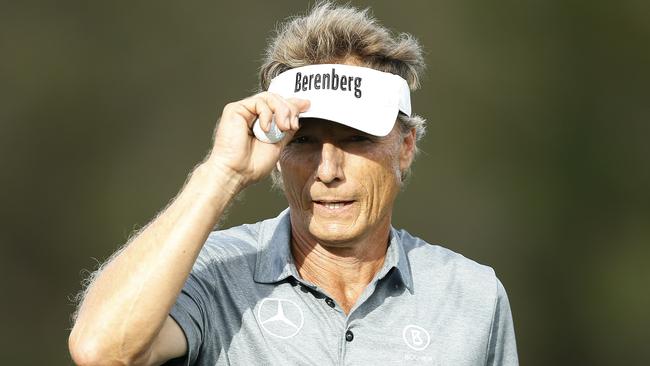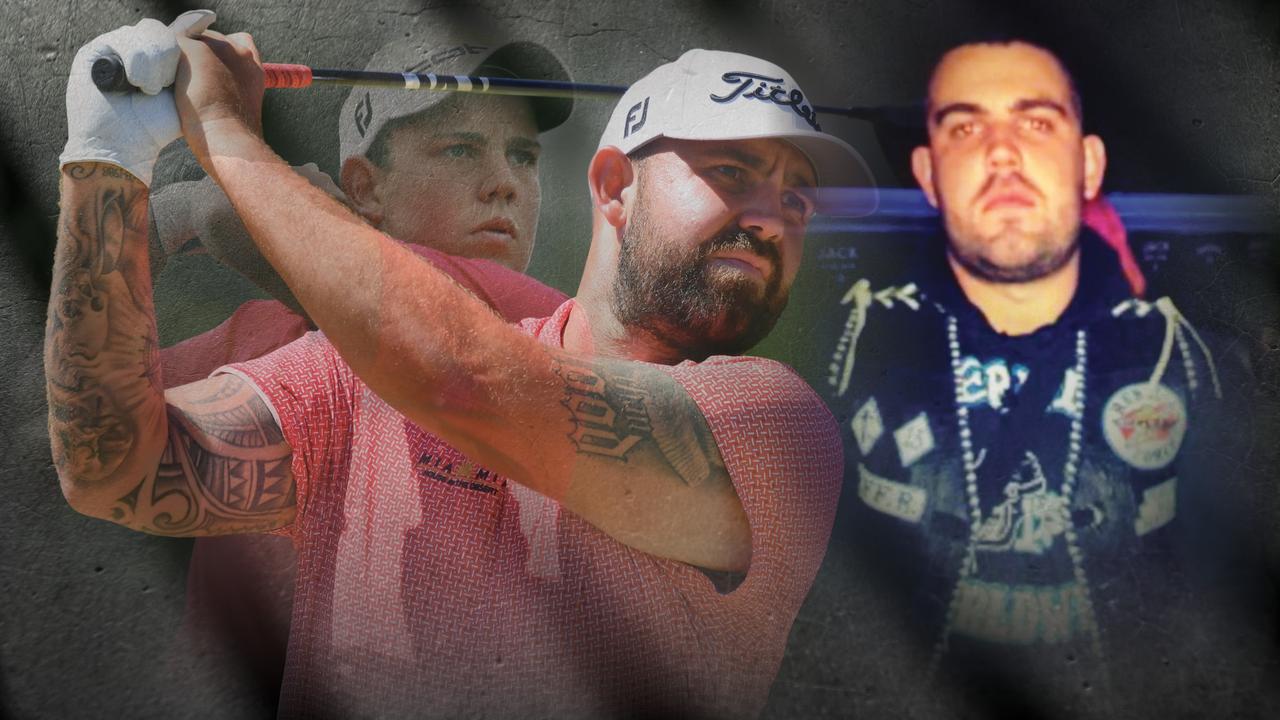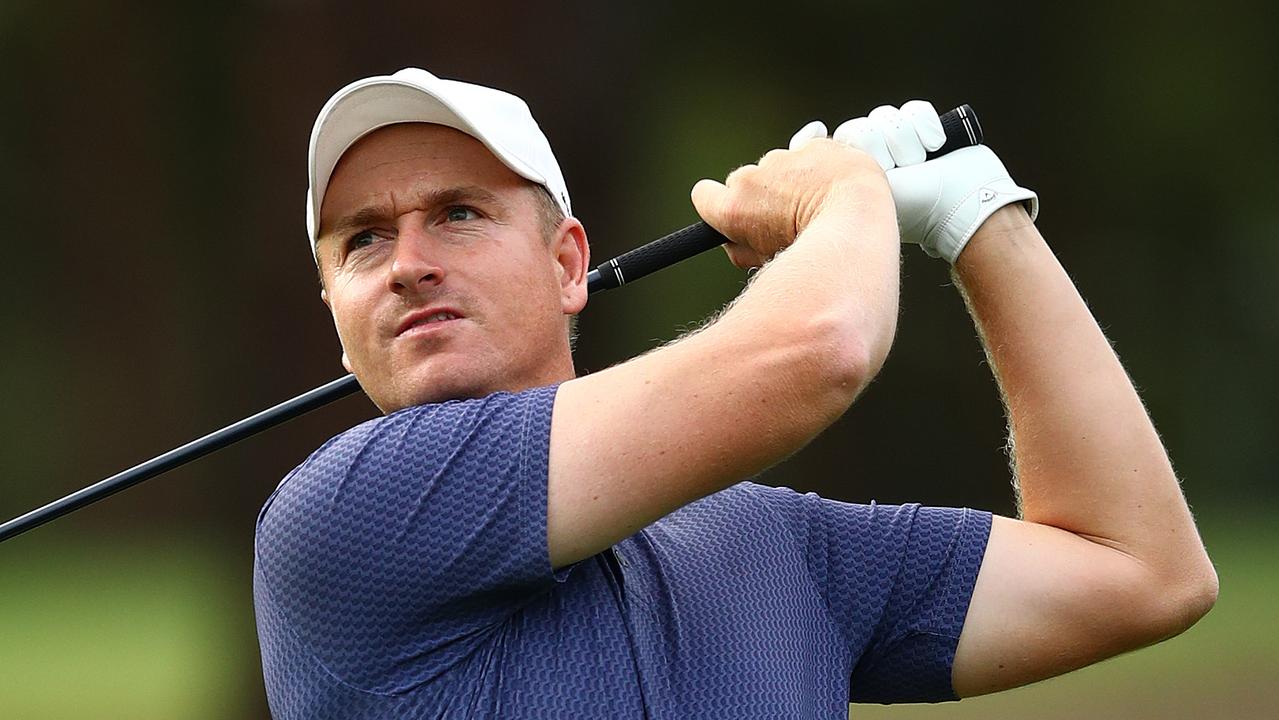Old guys will rule in the majors, says Bernhard Langer
As he prepares for his 38th Masters, Bernhard Langer believes an old guy will soon rule in the majors.

Sunday at the Masters last November and Bryson DeChambeau laboured to a round of 73. His playing partner that afternoon was Bernhard Langer, a 63-year-old grandfather who had just become the oldest man to make the cut at Augusta.
The two-times Masters champion is also the last person to win a major with a wooden driver. He signed for a 71 and finished the tournament ahead of the American who has been tilting the golf world off its axis.
It was a small but significant victory for the scalpel over the sledgehammer. The advent of gargantuan hitting has been the story of the golfing year. Since the first lockdown DeChambeau has increased his size and distance, won the US Open and suggested that Augusta is really a par 67 for him.
Even the R&A, a body whose preferred pace of change is glacial, wants new regulations to prevent golf becoming overwhelmed by musclemen.
Yet there was Langer, calmly plotting his way around a soft Augusta National with shots rarely seen these days. Now, on the eve of this year’s tournament, the 1985 and 1993 winner claims an old guy will soon rule.
“I absolutely believe a player in his fifties will win a major,” he says. “I’ll tell you why. Guys are staying fitter. Look at players like Phil Mickelson, Jim Furyk and Vijay Singh — they go on and on. Tom Watson almost won the Open when he was nearly 60 and this generation will maintain their fitness and health much better.
“I put Lee Westwood in that category. He looks a little overweight, but he is very fit. In the years ahead there are going to be more and more guys realising they can prolong their careers into their fifties and maybe sixties.”
The oldest major winner was Julius Boros, who was 48 when he triumphed at the 1968 US PGA Championship. Westwood, Europe’s player of the year and the runner-up at the Arnold Palmer Invitational and the Players Championship last month, turns 48 on April 24. Mickelson, Darren Clarke and Ernie Els won the Open in their forties. Tiger Woods was 43 when he defied common sense at the 2019 Masters.
Langer, himself, tied for eighth place at the Masters as recently as 2014. He started the final round in 2016 in third. He was better than Rory McIlroy over the last two rounds at the 2018 Open, which was no mean feat given the young pup was the runner-up.
No sourpuss griping from yesterday’s margins, Langer emerged from that Sunday in November as a DeChambeau fan. “It’s good for the game,” he says. “People are mesmerised and everybody loves to see a long ball. Let’s go back. Why was John Daly so popular? OK he was a bit unorthodox, but really it was distance that attracted people to him. He was the longest guy. It’s always been the same. It gets the media coverage. Even at your home club if you can drive 280 you’re the big dog.”
Langer averaged 260 yards off the tee at last year’s Masters. DeChambeau’s longest drive was 346 yards. They were, he says, playing different games. “I was fortunate to play with McIlroy on the Saturday and DeChambeau on the Sunday, two of the longest hitters of all time, and it was fascinating to watch the ball flight and see how they play. It’s not a game I’m familiar with. It was a huge challenge to be hitting two, three and four-irons into greens when they are hitting nine-irons, trying to score at the same time.
“I’ve played there since the early 1980s and on the 2nd hole you try to hit between the bunker and the tree, and run it down the hill if you can. They were taking it over the trees. The bunker is not in play any more. Then a seven-iron into the green. It’s just incredible. It’s hard to plot your way around the course, so it ranks up there among my better performances.”
If old golfers can overcome the difference in distance, is there any physical or mental reason why they cannot cross the generation gap? “There are a lot of things that could work against you,” Langer says. “It starts with your eyes. As you get older your eyes are usually not as good as when you’re in your twenties and thirties. It sounds simple but your eyes are important for reading putts and working out distance. Then there’s pressure. With all your experience your nerves may be a bit frayed. The brain has a memory bank of missed shots. It knows you have missed that four-foot putt. If you’re a kid, you don’t care.”
Langer’s well-documented battles with the putting yips underscore his insight. “Experience works for you and against you,” he adds. “You lose some flex, but the longer you play the more chances you have to swing the same way. I look at Lee and how he has improved his swing. You know your strengths and weaknesses. You have more wisdom.”
Langer’s stats are remarkable. As well as the two Green Jackets, he was twice runner-up at the Open and had another 15 top-10 finishes at the majors. He played in 10 Ryder Cup teams for Europe, winning six, and came back to add another as the captain in 2004. There were also 42 European Tour wins and, to date, 11 senior majors.
He is the only player to have received an honorary OBE, the Order of Merit of the Federal Republic of Germany and an apology from Donald Trump after the former US president had incorrectly used him as an example of voter fraud. Langer lives in the US and is a German citizen, but he was not turned away from the voting station in 2016 as Trump claimed.
Langer believes some of his endurance was inherited. His father jumped from a Russian PoW train in 1945. Soldiers shot some of the escapees but Langer Sr survived and spent three months scavenging for food in the woods before making it to Anhausen, where he became a bricklayer and started a family. Langer says he built his swing in the same way his father worked, brick by brick.
This interview formed part of Langer’s work as a Mercedes-Benz brand ambassador, but such commercial rewards were unimaginable growing up. “We came from a very poor background and had no money,” he says. “My brother started caddying at a club five miles away. He’d come home with a few Deutschmarks and so I started riding my bicycle there when I was nine. I fell in love. I saw how bad some of the adults were and started giving them lessons. It was funny, a 13-year-old giving a 50-year-old a lesson but it worked out.”
He left school at 15, became an assistant pro in Munich and was on the European Tour at 18, sleeping in his car and bug-infested hotels. Nine years later he was struggling at the Masters. “I changed my irons after two rounds. I’d got a new set and thought, ‘What the heck, I’ve got nothing to lose?’ He finished the day with a 68 and won the tournament by two strokes from Seve Ballesteros, Ray Floyd and Curtis Strange.
Elation faded quickly. “I’d won the Masters, was ranked world No 1 soon after and I was newly married to a beautiful young girl. Everything was going my way and all I felt was empty.”
He started to read the Bible and found his faith. When he won again in 1993, thanks in part to Chip Beck deciding he could not fly his ball 236 yards over the water and laying up on the 15th, he said it was more special given it was Easter Sunday.
That triumph was the last time anyone won a major with a persimmon driver. “We realised we were losing 20 yards in distance and some control too. What we have now is so much better.”
Whether DeChambeau is making the game better is a running debate between those in thrall to his innovation and those who think he is turning golf into a one-dimensional power-fest but, as he prepares for his 38th Masters, Langer, a 500-1 shot this year, believes the sport can still be a battle for the ages.
The Times


